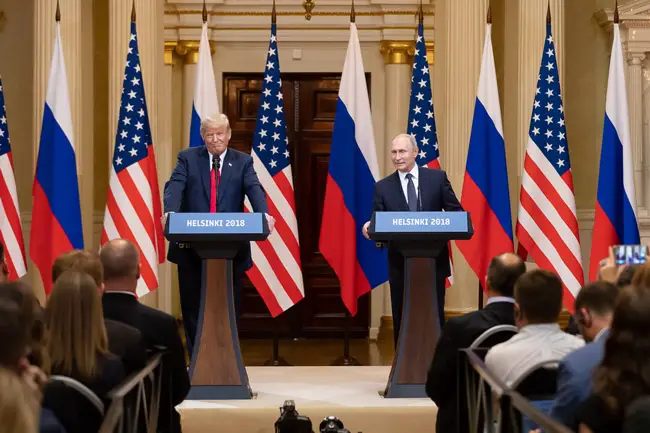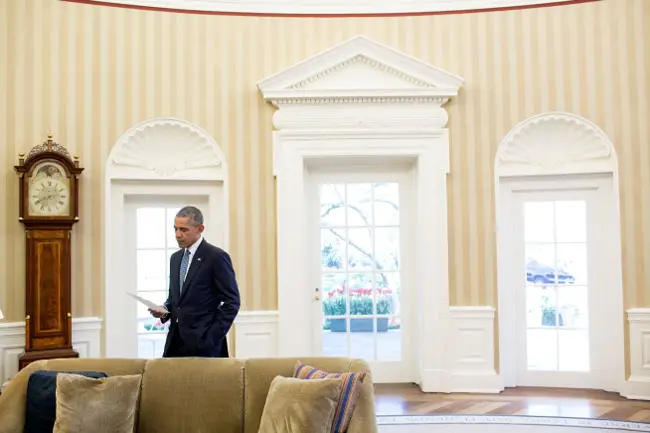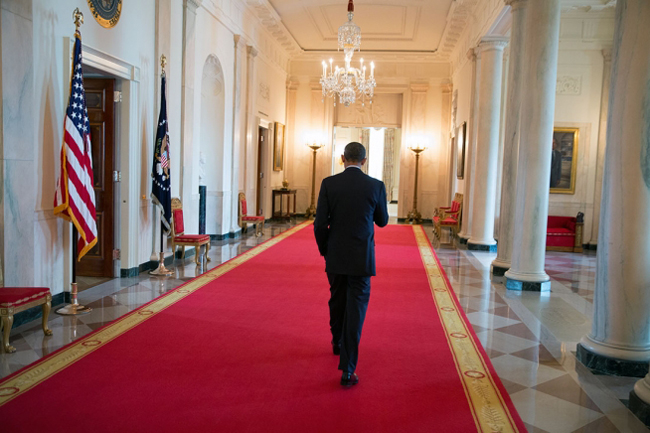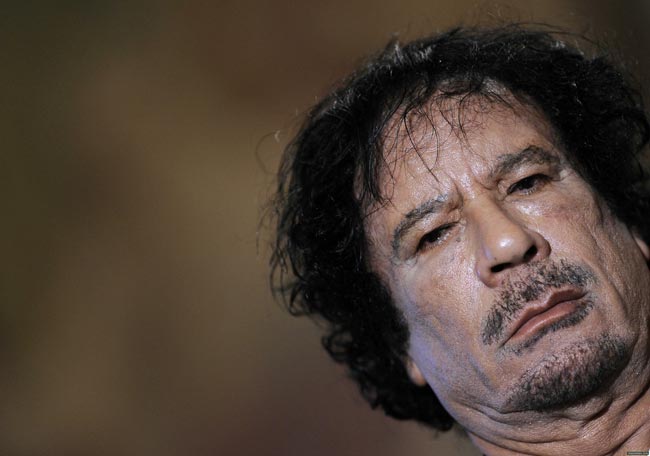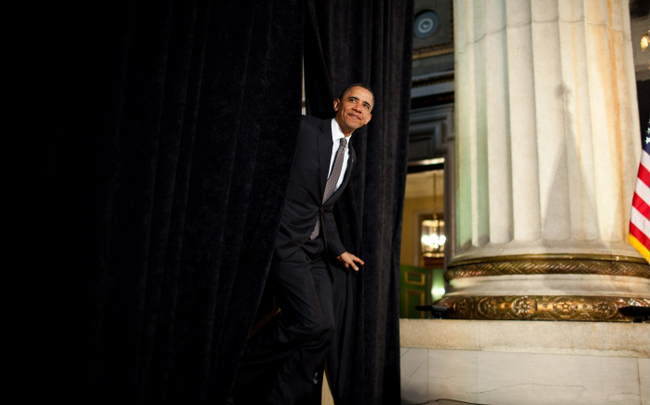Donald Trump once said he could shoot someone and not lose any votes. He’s right in the sense that he changed the rules of right and wrong, truth and lies, morality and immorality.
us foreign policy
Before Vilifying Russia, U.S. Policy Apologists Might Try Looking in the Mirror
A bellicose stance toward Russia has become so routine and widespread that we might not give it a second thought. That makes it all the more hazardous.
If Trump Is Giving Diplomacy a Chance in Korea, His Critics Should, Too
The North Korea negotiations are far from over, and could still tip from a fragile diplomacy back to middle-school insults, but diplomacy isn’t just the better way. It’s the only way.
Hawkish Hillary: Clinton May Sound Friendly to Muslims. But Her Record Is Bloodier.
Even while Hillary Clinton condemns Donald Trump’s erratic statements on foreign policy, there’s no evidence she sees any need to redraw her own hawkish playbook that goes back to her enthusiastic support for the Iraq war.
Benghazi Syndrome: Obama Learns the Wrong Lesson
There was clear support from Security Council members for the initial military action, which unquestionably spared thousands of innocent lives in Benghazi, argues Gareth Evans.
Obama in Cuba:
The Limits of “Engagement”
Indeed, if engagement is supposed to result in political change, US engagement with Cuba is most likely doomed to fail, writes Jorge G. Castañeda. After all, trade and investment have done nothing to bring about a democratic opening in Vietnam over the last 20 years.
Terrorism Isn’t the Biggest Threat Facing America. It’s Barely a Threat at All.
Ignorance, misplaced fear, irresponsible media and blustering presidential candidates have made more of terrorism than it deserves while sidelining the one weapon at America’s disposal in the fight: smarts.
The Real Enemy: Saudi Arabia’s Wahhabism, Mother to al-Qaeda, ISIS and the Taliban
If you want to know who inspired the Taliban, al-Qaeda and ISIS, look further than America’s “friend” and ally, Saudi Arabia, which has been financing the spread of Wahhabism’s lethal adulteration of Islam for years.
America’s Responsibility for Enabling ISIS, And How to End Blowback Terrorism
More wars – especially CIA-backed, Western-led wars – will solve nothing. By contrast, a surge of investment in education and sustainable development is the real key to building a more stable future for the Middle East and the world, argues Jeffrey Sachs.
Syrian Refugees, ISIS, the Attacks to Come and What To Do: A Grim Q&A
Tom O’Hara’s sobering answers to basic questions on the next ISIS attack, the refusal to take in Syrian refugees, what ISIS wants and whether an invasion of Syria and Iraq can work.
America’s Pious Embrace of the Police State
The easy worship of the use of force abroad for the past 15 years is coming home to roost in an escalation of police-state tactics and violence a majority of the public dangerously accepts if not condone.
Iran Nukes Deal Will Protect Against Saudi and Israeli Threats
Iran hasn’t launched a single war in 50 years. Israel has launched eight, Saudi Arabia has kept funding America’s worst enemies–ISIS, the Taliban and Al-Qaeda. Who are the real threats to Mideast peace?
How George W. Bush and Benjamin Netanyahu Helped Iran Win the Middle East
Bush’s wars in the Middle East left Iran as the most influential actor in Iraq, while Netanyahu’s vulgarity and stupidity have fundamentally misunderstood the Iran challenge of regional mastery.
Obama Doctrines, Bland Rhetoric, and the Mealy-Mouthed West
From President Barack Obama’s oxymoronic first-term mantra “leading from behind” to the recent German variant “leading from the center,” empty phrases have become the currency of Western governments, writes Ana Palacio.
It’s Not Benghazi: Hillary Clinton’s Real Scandal Is Honduras.
Desperate Honduran children are seeking refuge from a human rights nightmare that would cast a dark cloud over Hillary Clinton’s presidential bid right now if the media were paying any attention.
Israel’s March of Folly
Israel’s latest attack on Gaza reflects yet again that peculiar blend of arrogance and bigotry that has characterized Israeli policy toward Arabs since 1982: the arrogance that Israel is infallible, and the bigotry that sees Arabs either as inferior creatures to be walled off or as terrorists to be killed. It shouldn’t be surprised when the beasts rebel.
The Trouble With Veterans Day
It’s hard to see how, if a war is unjust, it can be heroic to wage it. So it’s flat-out preposterous to claim that everyone who has ever been in the U.S. military is a hero, argues Arnold Oliver, a Vietnam veteran who finds it troubling that Veterans Day has devolved into a hyper-nationalistic worship service of militarism.
The Trouble With American Exceptionalism
Do we have moral authority as a nation, asks Cary McMullen. Do we have the humility Obama spoke of, namely that we are acting not in self-interest but in the interest of justice? Are we exceptional not just in our history but in our standing among nations as an exemplar of righteous ideals?
Obama’s Born-Again Missile Envy Over Syria: Wrong on All Counts
Whether the Syrian regime used chemical weapons or not, Obama would be wrong to attack, even if Congress approves. It’s not America’s war to fight, it’s not Obama’s judgment to make, and his red line is an absurd marker when contrasted with two and a half years of atrocities, and 100,000 deaths, that never got a peep.
From Guernica to Who Gives a Damn: Modern Warfare’s Droning Savagery
There was a time when people could actually be shocked by the slaughter of civilians during a war. No more. We kid ourselves that our warfare is moral and clean and good and that it’s the other guys who commit the war crimes. Don’t believe it, argues Donald Kaul.
Beyond Qaddafi’s Good Riddance
Chest-thumping illusions aside, there wasn’t much difference between the killing of Qaddafi and the killing of bin Laden, and America’s coddling of other Arab dictators carries on.
When Obama Bombs
Barack Obama’s speech on the Middle East on Thursday was no landmark. It was a retreading of old cliches, a window into an administration at a loss for principled coherence, and an offense to Palestinian and Arab self-determination.
The Rise of Egyptian Aspirations, The Fall of the American Brand
It’s been exhilarating to watch Egyptians demand an end to the dictatorial regimes controlling their lives for decades. But it’s exhilaration mixed with dread, doubt, disappointment and embarrassment, particularly over American postures and prejudices.
Americans Owe More to Haiti Than They Know
Well beyond earthquake relief, an American commitment to independence and democracy in Haiti would not be a favor, a gift or an indulgence. It would be the down payment of an incalculable debt long overdue.
Obama’s Nobel Lecture: “Bend History”
In his Nobel peace prize lecture, Barack Obama evoked the notions of just wars to counter the irony of being “the Commander-in-Chief of the military of a nation in the midst of two wars.”




